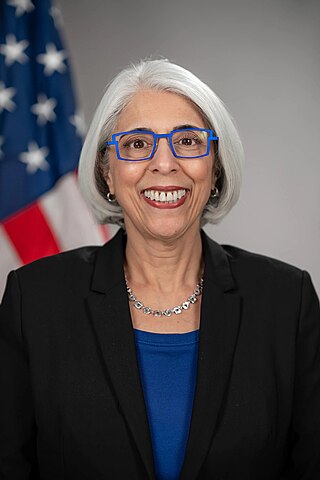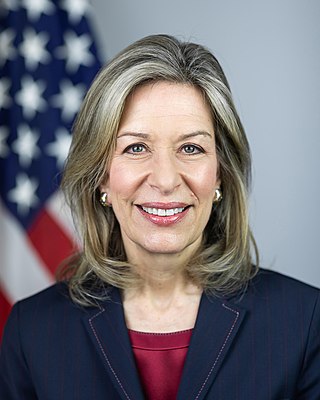Related Research Articles

John David Podesta Jr. is an American political consultant who served as Senior Advisor to the President for International Climate Policy from 2024 to 2025, having previously served as the Senior Advisor to the President for Clean Energy Innovation and Implementation from 2022 to 2024. Podesta previously served as White House chief of staff to President Bill Clinton from 1998 to 2001 and counselor to President Barack Obama from 2014 to 2015. Before that, he served in the Clinton administration as White House staff secretary from 1993 to 1995 and White House deputy chief of staff for operations from 1997 to 1998.

The energy policy of the United States is determined by federal, state, and local entities. It addresses issues of energy production, distribution, consumption, and modes of use, such as building codes, mileage standards, and commuting policies. Energy policy may be addressed via legislation, regulation, court decisions, public participation, and other techniques.

The President's Council of Advisors on Science and Technology (PCAST) is a council, chartered in each administration with a broad mandate to advise the president of the United States on science and technology. The current PCAST was established by Executive Order 13226 on September 30, 2001, by George W. Bush, was re-chartered by Barack Obama's April 21, 2010, Executive Order 13539, by Donald Trump's October 22, 2019, Executive Order 13895, by Joe Biden's February 1, 2021, Executive Order 14007 and by Donald Trump again on January 23, 2025 with Executive Order XXXXX.

Brian Christopher Deese is an American economic and political advisor who was the 13th director of the National Economic Council, serving under President Joe Biden.
The White House Office of Energy and Climate Change Policy was a government entity in the United States created in 2008 by President Barack Obama by Executive Order. It existed for over two years and was combined with another presidential office in April 2011. The office was created to coordinate administration policy on energy and global warming. Under the Biden administration, it has been succeeded by both the Office of Domestic Climate Policy and the Office on Clean Energy Innovation and Implementation.
The climate change policy of the United States has major impacts on global climate change and global climate change mitigation. This is because the United States is the second largest emitter of greenhouse gasses in the world after China, and is among the countries with the highest greenhouse gas emissions per person in the world. Cumulatively, the United States has emitted over a trillion metric tons of greenhouse gases, more than any country in the world.

John Paul Holdren is an American scientist who served as the senior advisor to President Barack Obama on science and technology issues through his roles as assistant to the president for science and technology, director of the White House Office of Science and Technology Policy, and co-chair of the President's Council of Advisors on Science and Technology (PCAST).

Senior Advisor to the President is a title used by high-ranking political advisors to the president of the United States. White House senior advisors are senior members of the White House Office. The title has been formally used since 1993.

Heather Renée Zichal(last name pronounced with long 'i') is an American executive, consultant, and political advisor who specializes in climate change and environmental policy.

Arati Prabhakar is an American engineer and public official. From October 3, 2022 until January 20, 2025, she had served as the 12th director of the White House Office of Science and Technology Policy and the Science Advisor to the President.

Regina McCarthy is an American air quality expert who served as the first White House national climate advisor from 2021 to 2022. She previously served as the thirteenth Administrator of the Environmental Protection Agency from 2013 to 2017.

Elizabeth D. Sherwood-Randall is an American national security and energy leader, public servant, educator, and author who served as the 11th United States Homeland Security Advisor in the Biden administration from 2021 to 2025. She previously served in both the Clinton and Obama administrations and held appointments at academic institutions and think tanks.

Frances Colón is an American science diplomat and environmental policy expert most notably having served at the United States Department of State between September 2008 and January 2017. In her work, she promotes the integration of science and technology into foreign policy dialogues; global scientific engagement for capacity-building; the advancement of women in STEM; and the use of innovation as a tool for economic growth around the world.

Andrea Joan Palm is an American government health advisor who served as the United States Deputy Secretary of Health and Human Services in the Biden administration from 2021 to 2025. Previously, Palm served as secretary-designee of the Wisconsin Department of Health Services from 2019 to 2021 in the administration of Governor Tony Evers, an office she was never sworn into due to Republican opposition in the Wisconsin Senate.

The White House Office of Domestic Climate Policy is an office within the White House Office that is part of the Executive Office of the President of the United States. It is headed by the Assistant to the President and National Climate Advisor, which is president's chief advisor on domestic climate change policy. In addition, the National Climate Advisor serves as vice-chair of the National Climate Task Force.

Ali A. Zaidi is a Pakistani-American lawyer and political advisor who served as the second White House National Climate Advisor from 2022 to 2025. He was the New York deputy secretary for energy and environment. Zaidi held climate policy positions in the Obama administration including United States Domestic Policy Council deputy director for energy policy and associate director for natural resources, energy, and science at the Office of Management and Budget. Zaidi was a policy aide to U.S. Energy Secretary Steven Chu. He served as the first White House Deputy National Climate Advisor from 2021 to 2022.
The environmental policy of the Joe Biden administration includes a series of laws, regulations, and programs introduced by United States President Joe Biden from 2021 to 2025. Many of the actions taken by the Biden administration reversed or attempted to reverse the first-term policies of his predecessor, Donald Trump.

Radenka Marić is an American engineer and academic who became the 17th president of the University of Connecticut (UConn) on September 28, 2022. She was the first internal candidate to be named president since Harry J. Hartley in 1990 and is the institution’s second female president. She had been interim president of the University of Connecticut since February 1, 2022, and previously was UConn's vice president for research and innovation.

The Inflation Reduction Act of 2022 (IRA) is a United States federal law which aims to reduce the federal government budget deficit, lower prescription drug prices, and invest in domestic energy production while promoting clean energy. It was passed by the 117th United States Congress and signed into law by President Joe Biden on August 16, 2022.
The White House Office on Clean Energy Innovation and Implementation is an office within the White House Office that is part of the Executive Office of the President of the United States. It was established on September 12, 2022, by Joe Biden via executive order in order to coordinate the policymaking process with respect to implementing the energy and infrastructure provisions of the Inflation Reduction Act and other essential initiatives. Biden selected John Podesta as Senior Advisor for Clean Energy Innovation and Implementation, which heads the office and reports directly to the President. In addition, the Senior Advisor for Clean Energy Innovation and Implementation chairs the National Climate Task Force, while the White House National Climate Advisor serves as Vice Chair.
References
- ↑ "Sonia Aggarwal | Midwest Climate Summit | Washington University in St. Louis". midwestclimatesummit.wustl.edu. Retrieved 2024-05-01.
- ↑ "E&E News: Clean energy expert to help climate team decarbonize grid".
- ↑ "Sonia Aggarwal". The Clean Energy Education & Empowerment (C3E) Initiative. Retrieved 2024-05-01.
- ↑ "E&E News: Top climate aide leaves the White House".
- ↑ "The Global Boardroom 7th Edition Agenda - A FTLive Event". globalboardroom2023.ft.com. Retrieved 2024-05-01.
- ↑ "Northeast Ohioan is one of President Biden's top climate policy advisors".
- ↑ "Hawken Alumna Joins White House Staff". 15 January 2021.
- ↑ "Sonia Aggarwal". Aspen Global Change Institute. Retrieved 2024-05-01.
- ↑ "Sonia Aggarwal - NE Ohioan and Clean Energy Advocate in the White House" (PDF). The Lotus. p. 1. Retrieved 2024-05-01.
- ↑ Dix, David E. "Along the Way: Biden climate advisor has Northeast Ohio roots". Record-Courier. Retrieved 2024-05-01.
- ↑ "National Indo-American Museum | Sonia Aggarwal" . Retrieved 2024-05-01.
- ↑ "Sonia Aggarwal". Energy Innovation: Policy and Technology. Retrieved 2024-05-01.